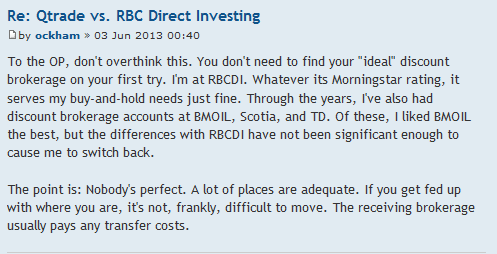It has been predictably quiet in the discount brokerage space this past week with many self-directed investors out enjoying summertime activities. Still, there are some updates on several discount brokerage promotions that are noteworthy as we head into July. Also, there are a couple of advertising/marketing stories that might be of interest for those keeping a closer eye on the industry.
Easy Come, Easy Go
The end of June is here and with it several discount brokerages are retiring some promotions. First, the Disnat SCATE promotion will end as of June 30th. Also slated to expire at the end of June will be the 100 free trades offer from Scotia iTrade. For details on the discount brokerage deals, check out our deals page here.
Not all the deals and promotions originally supposed to expire at the end of June will come to an end though. It seems that Scotia iTrade and Questrade have had a change of heart about a couple of their respective promotions. Scotia iTrade’s “Refer-a-Friend” offer has been extended to July 31st 2013 and Questrade also has extended its Advantage offer out to the end of August 2013.
Baby Not on Board
Even though it is not a Canadian discount brokerage, the news that the agency famous for bringing us the E*Trade baby is moving along signals a change in the times. Discount brokerages in the US spend hundreds of millions of dollars in advertising per year and it appears that E*Trade is making a move to lower these advertising costs. To read more about the story, click here.
Winning the Customer Service Game
Advertising also seems like it is on the mind of HSBC InvestDirect after their recent win of the Dalbar Direct Brokerage Service Award. We got what looks like a sneak peek at a promotional video that highlights what it took for the HSBC InvestDirect team to win this year.
Discount Brokerage Fees Still Matter
Last Friday’s article in the Globe and Mail ‘A primer on low-commission’ trading by Rob Carrick provided a quick overview of many discount brokerages’ fees. Both Virtual Brokers and Questrade stand out as low-fee choices however as we pointed out in the special series comparing these two discount brokerages to each other, the low-commission price may mask other fees, such as data or platform fees, that are required in order to fully take advantage of the low commission rates. An individual (named “Uss”) in the comments section of the article also made an interesting observation that Interactive Brokers wasn’t part of this low-commission rate primer although their rates are just as competitive at the lowest end of equity and option commission pricing currently available. Interactive Brokers has typically not been included in the annual online broker ratings that Rob Carrick publishes because they do not offer registered accounts and it would be safe to assume that is why they were not included in this primer either.
As a reminder for next week, Canadian stock exchanges will be closed on Monday July 1st for Canada Day and U.S Markets will close early (1PM) on July 3rd and will be closed all day July 4th.
Hope you all have a safe and enjoyable Canada Day and long weekend!






